Related Research Articles
Super Bowl V was an American football game played between the American Football Conference (AFC) champion Baltimore Colts and the National Football Conference (NFC) champion Dallas Cowboys to determine the National Football League (NFL) champion for the 1970 season. It was the fifth edition of the Super Bowl and the first modern-era NFL championship game. The Colts defeated the Cowboys by the score of 16–13 on a field goal with 5 seconds left in the game. The game was played on January 17, 1971, at the Orange Bowl in Miami, Florida, and was the first Super Bowl game played on artificial turf; specifically, the game was played on a Poly-Turf surface.

Super Bowl X was an American football game between the National Football Conference (NFC) champion Dallas Cowboys and the American Football Conference (AFC) champion Pittsburgh Steelers to decide the National Football League (NFL) champion for the 1975 season. The Steelers defeated the Cowboys by the score of 21–17 to win their second consecutive Super Bowl. They were the third team to win back-to-back Super Bowls. It was also the first Super Bowl in which both participating teams had previously won a Super Bowl, as the Steelers were the defending champions and the Cowboys had won Super Bowl VI.

Super Bowl XII was an American football game between the National Football Conference (NFC) champion Dallas Cowboys and the American Football Conference (AFC) champion Denver Broncos to decide the National Football League (NFL) champion for the 1977 season. The Cowboys defeated the Broncos 27–10 to win their second Super Bowl. The game was played on January 15, 1978, at the Louisiana Superdome in New Orleans. This was the first Super Bowl in a domed stadium, and the first time that the game was played in prime time in the Eastern United States.
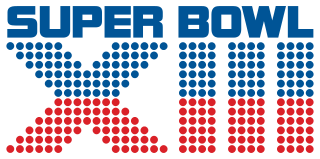
Super Bowl XIII was an American football game between the American Football Conference (AFC) champion Pittsburgh Steelers and the National Football Conference (NFC) champion Dallas Cowboys to decide the National Football League (NFL) champion for the 1978 season. The Steelers defeated the Cowboys by the score of 35–31. The game was played on January 21, 1979, at the Miami Orange Bowl in Miami, Florida, the fifth and last time that the Super Bowl was played in that stadium.
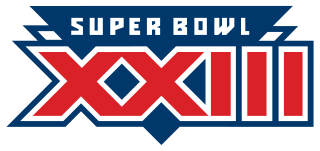
Super Bowl XXIII was an American football game between the American Football Conference (AFC) champion Cincinnati Bengals and the National Football Conference (NFC) champion San Francisco 49ers to decide the National Football League (NFL) champion for the 1988 season. The 49ers defeated the Bengals 20–16, winning their third Super Bowl. The game was played on January 22, 1989, at Joe Robbie Stadium in Miami. This was the first Super Bowl hosted in the Miami area in 10 years, and the first in Miami not held at the Orange Bowl.
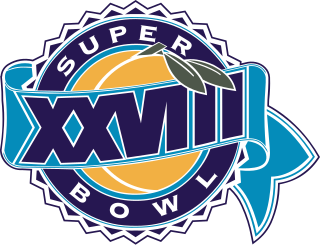
Super Bowl XXVIII was an American football game between the National Football Conference (NFC) champion Dallas Cowboys and the American Football Conference (AFC) champion Buffalo Bills to decide the National Football League (NFL) champion for the 1993 season. The Cowboys defeated the Bills, for the second straight year, by a score of 30–13, winning their fourth Super Bowl in team history, tying the Pittsburgh Steelers and the San Francisco 49ers for most Super Bowl wins. The Buffalo Bills became the only team to both play and lose four consecutive Super Bowls for a 0-4 franchise Super Bowl record, and as of 2023, remains the team's most recent Super Bowl appearance. The game was played on January 30, 1994, at the Georgia Dome in Atlanta. Since the 1993 regular season was conducted over 18 weeks, the traditional bye week between the conference championship games and the Super Bowl was not employed; the last time this had happened was before Super Bowl XXV.
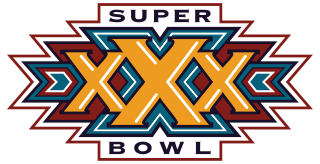
Super Bowl XXX was an American football game between the National Football Conference (NFC) champion Dallas Cowboys and the American Football Conference (AFC) champion Pittsburgh Steelers to decide the National Football League (NFL) champion for the 1995 season. The Cowboys defeated the Steelers by the score of 27–17, winning their fifth Super Bowl in team history. The game was played on January 28, 1996, at Sun Devil Stadium in Tempe, Arizona, the first time the Super Bowl was played in the Phoenix metropolitan area.
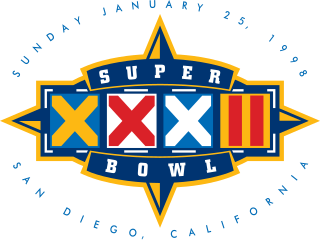
Super Bowl XXXII was an American football game played between the National Football Conference (NFC) champion and defending Super Bowl XXXI champion Green Bay Packers and the American Football Conference (AFC) champion Denver Broncos to decide the National Football League (NFL) champion for the 1997 season. The Broncos defeated the Packers by the score of 31–24. The game was played on January 25, 1998, at Qualcomm Stadium in San Diego, California, the second time that the Super Bowl was held in that city. Super Bowl XXXII also made Qualcomm Stadium the only stadium in history to host both the Super Bowl and the World Series in the same year.
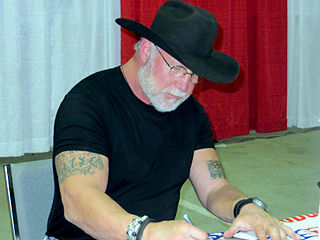
Randall Lee White, nicknamed "the Manster", is an American former professional football player who was a defensive tackle for the Dallas Cowboys in the National Football League (NFL) from 1975 to 1988. He played college football for the Maryland Terrapins from 1972 to 1974. He is a member of the College Football Hall of Fame (1994), the Pro Football Hall of Fame (1994) and the Delaware Sports Hall of Fame (1994).
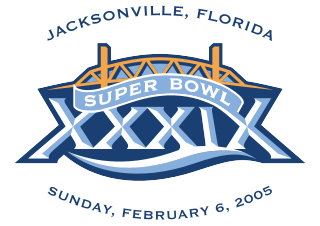
Super Bowl XXXIX was an American football game played between the American Football Conference (AFC) champion New England Patriots and the National Football Conference (NFC) champion Philadelphia Eagles to decide the National Football League (NFL) champion for the 2004 season. The Patriots defeated the Eagles by the score of 24–21. The game was played on February 6, 2005, at Alltel Stadium in Jacksonville, Florida, the first time the Super Bowl was played in that city.

Julius Frazier Peppers is an American former professional football player who was a defensive end and linebacker in the National Football League (NFL). He played college football for the North Carolina Tar Heels, where he was recognized as a unanimous All-American, and was selected by the Carolina Panthers second overall in the 2002 NFL draft, and also played for the Chicago Bears from 2010 through 2013 and the Green Bay Packers from 2014 to 2016. After rejoining the Panthers for the 2017 season, he retired after the 2018 NFL season.

Tedy Lacap Bruschi is an American former football linebacker who played in the National Football League (NFL) for 13 seasons. He played college football for the Arizona Wildcats, where he earned two-time consensus All-American. He was selected by the New England Patriots in the third round of the 1996 NFL draft, and played his entire professional career with them. Bruschi won three Super Bowls and was a two-time second-team All-Pro selection.
Larry Christopher Allen Jr. is an American former football guard who played in the National Football League (NFL) for fourteen seasons, primarily with the Dallas Cowboys. He played college football for the Butte Roadrunners and the Sonoma State Cossacks, and was selected by the Cowboys in the second round of the 1994 NFL draft. Allen is regarded as one of the NFL's physically strongest players ever, while also capable of using his speed against defenders.
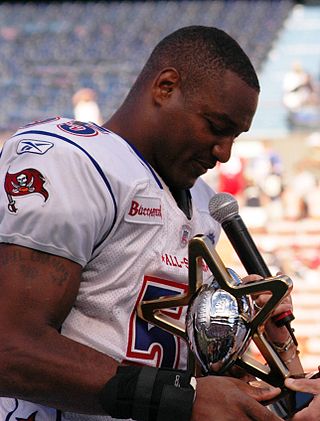
Derrick Dewan Brooks is an American former football linebacker who played for his entire 14-year career in the National Football League (NFL) with the Tampa Bay Buccaneers. Brooks played college football for the Florida State Seminoles, earning consensus All-American honors twice. He was selected by the Buccaneers in the first round of the 1995 NFL draft. An 11-time Pro Bowl selection and five-time first-team All-Pro, Brooks was the NFL Defensive Player of the Year in 2002 en route to winning the franchise's first Super Bowl title in Super Bowl XXXVII. Following his retirement, Brooks served as co-owner and president of the Tampa Bay Storm in the Arena Football League (AFL) from 2011 to 2017. He was inducted to the Pro Football Hall of Fame in 2014 and the College Football Hall of Fame in 2016.
Charles Lewis Haley is an American former professional football player who played in the National Football League (NFL) for the San Francisco 49ers and Dallas Cowboys (1992–1996).

James Wilson Jeffcoat, Jr. is an American former professional football player who was a defensive end in the National Football League (NFL) for the Dallas Cowboys and Buffalo Bills. He played college football for the Arizona State Sun Devils. He won two Super Bowls with the Cowboys over the Bills. After his playing career, he became a coach.
Jethro Pugh Jr. was an American football defensive tackle in the National Football League (NFL) for the Dallas Cowboys for fourteen seasons. He played college football at Elizabeth City State College.
John Owen Dutton is an American former professional football player who was a defensive lineman in the National Football League (NFL) for the Baltimore Colts and Dallas Cowboys. He played college football for the Nebraska Cornhuskers.
Jimmie Sims Jones is a former professional American football defensive tackle in the National Football League (NFL) for the Dallas Cowboys, Los Angeles/St. Louis Rams, and Philadelphia Eagles. He played college football at the University of Miami. With the Cowboys, he won back-to-back Super Bowls over the Buffalo Bills.
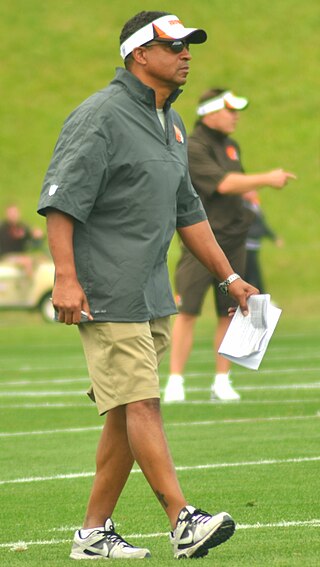
Raymond Anthony Horton is an American football coach and former player. He played college football at Washington and was drafted in the second round of the 1983 NFL Draft by the Cincinnati Bengals.
References
- 1 2 Stölen-Jacobson, Jessica. "Former NFL player who grew up in local area publishes book". www.granitefallsnews.com. Archived from the original on 22 February 2022.
- ↑ "'Breath Taking' Air Force Favored To Win" . Retrieved March 16, 2019.
- ↑ "Zero Club: Cowboys' Larry Cole wanted no publicity, but his talent refused to cooperate". 14 January 2021.
- ↑ "Larry Cole shares the personal story of how a Minnesota farm boy made his dreams come true – West Central Tribune". 2 April 2022.
- ↑ "UH Gets Air Force's Top Lineman" . Retrieved March 16, 2019.
- ↑ "Larry Cole Top Defensive Star" . Retrieved March 16, 2019.
- ↑ "Cowboys' Larry Cole retiring". The Paris News. 27 March 1981. p. 16. Retrieved March 16, 2019.
- ↑ "Cole Announces Retirement" . Retrieved March 16, 2019.
- ↑ "Cole steps into limelight with retirement" . Retrieved March 16, 2019.
- ↑ "Just Ware-ing 'Em Out" . Retrieved March 16, 2019.
- ↑ "Cole Was A Merry Old Soul" . Retrieved March 16, 2019.
- ↑ "Ex-Cowboys sue over concussions". 24 April 2012. Retrieved March 16, 2019.